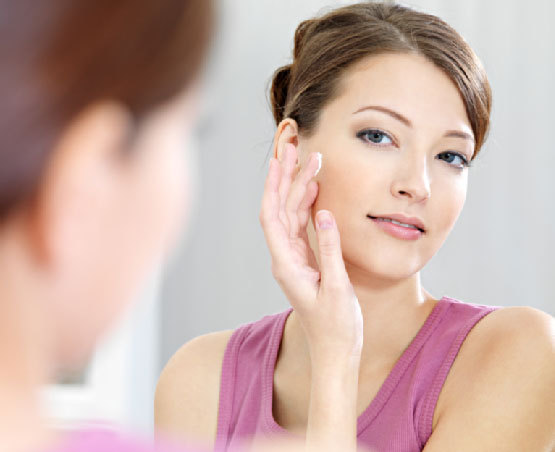Skin Care Article- Written by Dr. Angela Brimhall

The skin is the largest and most visible organ of the human body. It protects your other organs and often reflects how healthy you are inside. The skin of your face is especially visible and plays a large role in identity and making a first impression. This makes skincare an essential part of your health and well being. The following are a few recommendations to ensure that your skin reflects your best self.
Washing Cleanse your skin regularly to keep it healthy. If you have sensitive or acne-prone skin, cleansing should involve mild cleansers used with our without water twice daily. These cleansers dissolve sweat, oil, and dead skin cells which can encourage bacterial growth. Moisturization Cleansing should be followed by moisturizing – especially in our dry Utah climate! The best time to apply a moisturizer is directly after showering or bathing. Pat or blot your skin until it’s just barely dry, then apply moisturizer immediately to help trap water in the surface cells. Moisturizers can protect sensitive skin, improve skin tone and texture, and mask imperfections. Because of our climate, most people need to restore moisture to dry skin. Choose a heavier, oil-based moisturizer or for very dry, cracked skin, petrolatum-based products are preferable. They have more staying power than creams do and are more effective at preventing water from evaporating from your skin.
It’s good to maintain a healthy skepticism of products that promise to transform your skin and your looks. Because skincare products are not subject to approval by the U.S. Food and Drug Administration (FDA), their benefits may not be adequately tested and their claims may be exaggerated. Don’t necessarily buy the most expensive brand. Keep in mind that cost has no definite relationship to effectiveness. Ask your dermatologist for recommendations for skincare products that have strong science behind them and have been proven safe and effective in human studies.
UV Protection Another critical step in caring for your skin is to protect it from the sun. You need to protect your skin from the sun every day. Too much sun can result in fine lines and wrinkles in the skin over time and has been associated with an increased risk of skin cancer. To protect yourself use a sunscreen with a sun protection factor (SPF) of at least 30. Look for a sunscreen that protects you from both UVA and UVB rays, often labeled as “broad-spectrum.” I prefer products with at least 6-9% of zinc oxide. Don’t forget you can also cover up by wearing a hat, sunglasses, and clothes that cover your arms and legs. Also, seek shade especially when the sun’s rays are strongest between 10 a.m. and 2 p.m. Don’t ever use tanning beds as they have been associated with an increased incidence of skin cancer and can age the skin faster.
These are 3 areas of emphasis when caring for your skin. Of course, if you have any specific concerns or questions feel free to schedule an appointment to discuss the right skin care regimen for you!
Dr. Angela Brimhall
Swinyer – Woseth Dermatology
